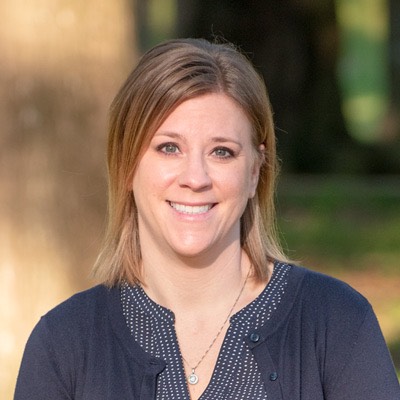Q&A with Susan Bareis, Assistant Director of Wellness & Health Promotion and Coordinator of The Lighthouse Program at LSU
04/05/2021
BATON ROUGE - Through The Lighthouse Program, Susan Bareis is responsible for coordinating
interpersonal violence prevention, support and resources for LSU students through
the Office of Wellness and Health Promotion in the LSU Student Health Center. In addition,
she oversees the Student Health Center’s rapid HIV testing program and provides campus-wide
health education on topics impacting LSU students. Bareis has been working at LSU
for seven years.

Susan Bareis is the Assistant Director of Wellness & Health Promotion and Coordinator of The Lighthouse Program at LSU.
What is The Lighthouse Program and who can use its resources?
The Lighthouse Program provides free and confidential interpersonal violence prevention,
support and advocacy to LSU students. The program assists student-survivors of sexual
assault, interpersonal violence, stalking and harassment.
What is The Lighthouse Program’s mission?
The Lighthouse Program strives to provide confidential, non-judgmental support services
for all survivors of interpersonal violence, regardless of gender, ethnicity, sexual
orientation, age, ability or decision to report the crime. The program wants to ensure
survivors never have to navigate the medical, legal, mental health or university system
alone, by offering support, guidance, education and referrals.
The program’s goals include:
- Provide a safe place for a survivor to disclose and express their feelings
- Support the survivor and help meet their needs
- Stabilize their reactions to the trauma
- Help the survivor prioritize and plan to resolve their concerns
- Provide information and referrals
What services are available to students, as well as for employees?
The Lighthouse Program provides a variety of options for recovery and support including
assistance with obtaining medical care and evidence collection, developing a safety
plan and arranging for safe housing, coordinating emotional support, securing academic
accommodations, and assisting with reporting options. The program provides additional
referrals to appropriate services and resources as needed. Anyone can seek support
and resources without reporting to law enforcement and/or LSU. The Lighthouse Program
provides services to LSU students, though the program will gladly guide employees
to community resources for support.
Why is this program unique?
The Lighthouse Program is unique from other programs in that we have a robust, and
growing, group of trained faculty and staff who volunteer their time as Lighthouse
Advocates. The Lighthouse Advocates are vital in increasing awareness about the program
and providing more students with Lighthouse services.
Lighthouse Advocates are specially trained university faculty and staff located throughout campus who can provide confidential guidance and support to student survivors and students-at-risk. The purpose behind training Lighthouse Advocates throughout campus is to provide students multiple avenues for receiving support. We recognize students may not feel comfortable coming to the Student Health Center for assistance, but may feel confident seeking a Lighthouse Advocate in their academic college or their office of employment for support. Currently there are over 100 trained Lighthouse Advocates on campus trained to provide confidential support to students. For more information about becoming a Lighthouse Advocate visit: https://lsu.edu/shc/wellness/classes.php.
How can LSU employees become more involved?
Sexual violence impacts each and every one of us directly, or indirectly, and we all
have a powerful role in ending it. I encourage LSU employees to engage in important,
and sometimes uncomfortable conversations surrounding sexual violence. Most importantly,
support survivors through action and policy change. Get involved with campus and community
organizations and initiatives that are passionate about the prevention of sexual violence
and the support of those who have experienced some form of sexual violence.
As we saw in the Husch Blackwell report, there are a number of changes to be made
and work to be done; what changes do you look forward to seeing being enacted on campus?
I look forward to LSU prioritizing survivors through additional funding and staffing,
but most importantly adequate training to provide students, staff and faculty with
a foundation for initiating a culture change on our campus. Sexual violence is a public
health issue we need to work to prevent through training and education.
How can we as a community work together to make LSU a better, safer, more inclusive
place?
As an institution of higher learning, it all starts with education. Educate yourself
and others, and listen to learn. Be open to conversations about healthy sexuality,
consent, and the issue of sexual violence, including the causes and impact of it.
Is there a time or experience at LSU that particularly stands out to you?
I have had so many positive experiences during my time at LSU, it’s difficult to choose
just one, but as I think back on the last few years some of the toughest moments are
my most proud while working with student survivors at LSU. I have supported and guided
countless students through extremely difficult times, to only see them come out from
those times with more strength than I could ever imagine. It’s truly humbling to have
such an important role on this campus, and such amazing support from the students
I have worked with throughout my time coordinating The Lighthouse Program.
-30-
Contact Rachel Holland
LSU Media Relations
rachelsp@lsu.edu